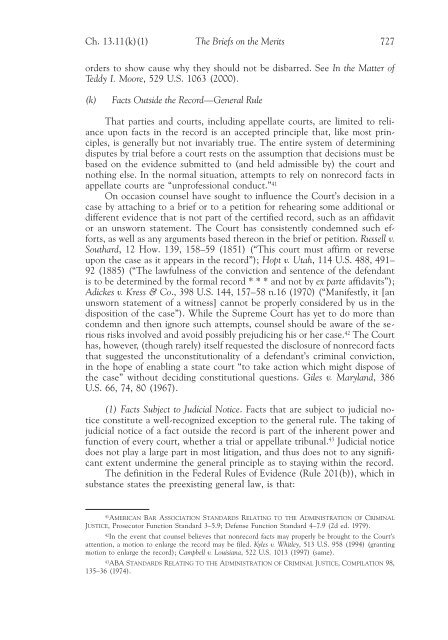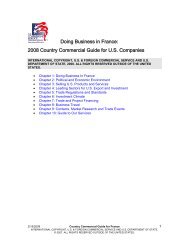Create successful ePaper yourself
Turn your PDF publications into a flip-book with our unique Google optimized e-Paper software.
Ch. 13.11(k)(1) <str<strong>on</strong>g>The</str<strong>on</strong>g> <str<strong>on</strong>g>Briefs</str<strong>on</strong>g> <strong>on</strong> <strong>the</strong> <strong>Merits</strong> 727<br />
orders to show cause why <strong>the</strong>y should not be disbarred. See In <strong>the</strong> Matter of<br />
Teddy I. Moore, 529 U.S. 1063 (2000).<br />
(k) Facts Outside <strong>the</strong> Record—General Rule<br />
That parties and courts, including appellate courts, are limited to reliance<br />
up<strong>on</strong> facts in <strong>the</strong> record is an accepted principle that, like most principles,<br />
is generally but not invariably true. <str<strong>on</strong>g>The</str<strong>on</strong>g> entire system of determining<br />
disputes by trial before a court rests <strong>on</strong> <strong>the</strong> assumpti<strong>on</strong> that decisi<strong>on</strong>s must be<br />
based <strong>on</strong> <strong>the</strong> evidence submitted to (and held admissible by) <strong>the</strong> court and<br />
nothing else. In <strong>the</strong> normal situati<strong>on</strong>, attempts to rely <strong>on</strong> n<strong>on</strong>record facts in<br />
appellate courts are “unprofessi<strong>on</strong>al c<strong>on</strong>duct.” 41<br />
On occasi<strong>on</strong> counsel have sought to influence <strong>the</strong> Court’s decisi<strong>on</strong> in a<br />
case by attaching to a brief or to a petiti<strong>on</strong> for rehearing some additi<strong>on</strong>al or<br />
different evidence that is not part of <strong>the</strong> certified record, such as an affidavit<br />
or an unsworn statement. <str<strong>on</strong>g>The</str<strong>on</strong>g> Court has c<strong>on</strong>sistently c<strong>on</strong>demned such efforts,<br />
as well as any arguments based <strong>the</strong>re<strong>on</strong> in <strong>the</strong> brief or petiti<strong>on</strong>. Russell v.<br />
Southard, 12 How. 139, 158–59 (1851) (“This court must affirm or reverse<br />
up<strong>on</strong> <strong>the</strong> case as it appears in <strong>the</strong> record”); Hopt v. Utah, 114 U.S. 488, 491–<br />
92 (1885) (“<str<strong>on</strong>g>The</str<strong>on</strong>g> lawfulness of <strong>the</strong> c<strong>on</strong>victi<strong>on</strong> and sentence of <strong>the</strong> defendant<br />
is to be determined by <strong>the</strong> formal record * * * and not by ex parte affidavits”);<br />
Adickes v. Kress & Co., 398 U.S. 144, 157–58 n.16 (1970) (“Manifestly, it [an<br />
unsworn statement of a witness] cannot be properly c<strong>on</strong>sidered by us in <strong>the</strong><br />
dispositi<strong>on</strong> of <strong>the</strong> case”). While <strong>the</strong> Supreme Court has yet to do more than<br />
c<strong>on</strong>demn and <strong>the</strong>n ignore such attempts, counsel should be aware of <strong>the</strong> serious<br />
risks involved and avoid possibly prejudicing his or her case. 42 <str<strong>on</strong>g>The</str<strong>on</strong>g> Court<br />
has, however, (though rarely) itself requested <strong>the</strong> disclosure of n<strong>on</strong>record facts<br />
that suggested <strong>the</strong> unc<strong>on</strong>stituti<strong>on</strong>ality of a defendant’s criminal c<strong>on</strong>victi<strong>on</strong>,<br />
in <strong>the</strong> hope of enabling a state court “to take acti<strong>on</strong> which might dispose of<br />
<strong>the</strong> case” without deciding c<strong>on</strong>stituti<strong>on</strong>al questi<strong>on</strong>s. Giles v. Maryland, 386<br />
U.S. 66, 74, 80 (1967).<br />
(1) Facts Subject to Judicial Notice. Facts that are subject to judicial notice<br />
c<strong>on</strong>stitute a well-recognized excepti<strong>on</strong> to <strong>the</strong> general rule. <str<strong>on</strong>g>The</str<strong>on</strong>g> taking of<br />
judicial notice of a fact outside <strong>the</strong> record is part of <strong>the</strong> inherent power and<br />
functi<strong>on</strong> of every court, whe<strong>the</strong>r a trial or appellate tribunal. 43 Judicial notice<br />
does not play a large part in most litigati<strong>on</strong>, and thus does not to any significant<br />
extent undermine <strong>the</strong> general principle as to staying within <strong>the</strong> record.<br />
<str<strong>on</strong>g>The</str<strong>on</strong>g> definiti<strong>on</strong> in <strong>the</strong> Federal Rules of Evidence (Rule 201(b)), which in<br />
substance states <strong>the</strong> preexisting general law, is that:<br />
41AMERICAN BAR ASSOCIATION STANDARDS RELATING TO THE ADMINISTRATION OF CRIMINAL<br />
JUSTICE, Prosecutor Functi<strong>on</strong> Standard 3–5.9; Defense Functi<strong>on</strong> Standard 4–7.9 (2d ed. 1979).<br />
42In <strong>the</strong> event that counsel believes that n<strong>on</strong>record facts may properly be brought to <strong>the</strong> Court’s<br />
attenti<strong>on</strong>, a moti<strong>on</strong> to enlarge <strong>the</strong> record may be filed. Kyles v. Whitley, 513 U.S. 958 (1994) (granting<br />
moti<strong>on</strong> to enlarge <strong>the</strong> record); Campbell v. Louisiana, 522 U.S. 1013 (1997) (same).<br />
43 ABA STANDARDS RELATING TO THE ADMINISTRATION OF CRIMINAL JUSTICE, COMPILATION 98,<br />
135–36 (1974).












